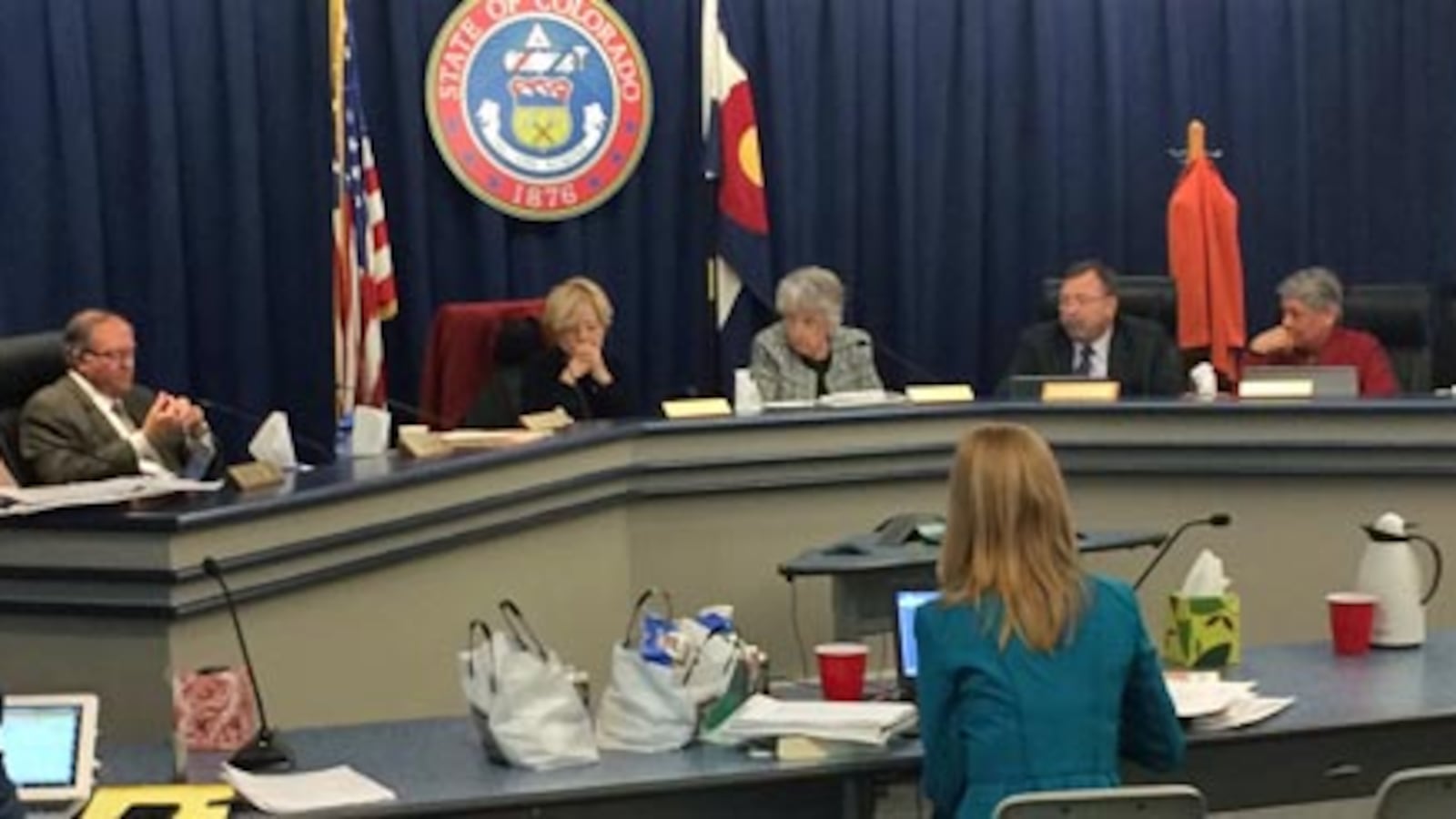The State Board of Education has taken some surprise actions on testing in its first two meetings of 2015, and there’s also a new tone in some board members’ questions and comments during presentations by Department of Education staffers.
The board voted Wednesday to end penalties for districts if they drop below required test participation levels because of parents opting kids out of tests (see story).
Thursday’s meeting didn’t yield any big decisions as board members sat through a long agenda of briefings on some major issues. Most of those agenda items were progress reports on matters like testing and high school graduation guidelines, work primarily mandated by the legislature in the wave of education reform bills passed over the last six years.
Some member comments indicated an interesting level of skepticism about the basic premises behind those programs. Here’s a sampling:
Testing and academic standards – State testing chief Joyce Zurkowski gave the board an update on the complicated process for setting “cut scores” to establish achievement levels on the science and social studies tests given to high school seniors last fall.
Republican board member Steve Durham of Colorado Springs called the descriptions of the four achievement levels “kind of hokey” and suggested the test results be reported merely as percentiles of how students scored. People want to know “how do you stack up against other Colorado students.” He cited Iowa Test of Basic Skills results as an example.
Zurkowski explained that the tests are designed to show student knowledge on academic standards, not just percentile comparisons.
“The problem I have is … the standards don’t mean anything. They are a subjective measure that some individuals or groups have put together,” Durham said. Just report test scores “by percentile and send them out to the schools and let them do what they want,” he suggested.
Board member Angelika Schroeder, a Boulder Democrat, called that “good old 1950s information” and argued that reporting test scores in that way “isn’t the goal that has been stated by our legislature.”
Member Deb Scheffel, a Douglas County Republican, warned that reporting test scores by the four achievement levels is “creating a narrative of failure” and asked “What are our options?” (She was referring to the results of the new science and social studies tests for elementary and middle school students. Only about a third of fifth and eighth graders scored in the two highest levels on science tests, and 17 percent of fourth and seventh graders scored at those levels on social studies. See this story for details.)
Pulling out of Common Core – The board also was briefed Thursday on the mechanics of pulling Colorado out of the Common Core State Standards and the PARCC tests. (Basically the board can’t do that by itself – see this legal memo.)
Scheffel suggested that the state needs less-detailed standards that create “a core of commonality rather than the pervasive commonality we’ve created with Common Core and PARCC.”
Republican member Pam Mazanec, also of Douglas County, said this about the Common Core: “For me it does not matter if these standards are perfect. I’m opposed to them because they invite federal intrusion. Standards drive curriculum, they invite federal intrusion in curriculum.”
Graduation guidelines – One of the many components of the 2008 Colorado Achievement Plan for Kids law was creation of high school graduation “guidelines” that school districts are supposed to meet or exceed. The board was updated (see slides) on that long-running process; the eventual guidelines won’t go into effect until the end of the decade.
Durham complained, “These are not guidelines” and should be labeled as requirements. Scheffel said she felt the proposed plan was much too detailed. “What is the minimum the State Board can do? Being heavy on the regulatory side doesn’t really serve the kids, the parents, the schools,” she said.
The board is scheduled to vote on the guidelines later in the spring.
Chair Marcia Neal, a Republican from Grand Junction, closed the long afternoon session by calling it “a good meeting” but gently noting, “I do get a little concerned about the accusatory note sometimes toward the staff.” (Durham had been a bit abrupt with Senior Assistant Attorney General Tony Dyl at various times Wednesday.)
Neal also told Durham, “I strongly suggest that when you have a motion you write it out.” Durham’s motions on testing in January and on Wednesday were made orally. Neal also suggested members should have a month to consider such motions before voting. Durham didn’t say anything in reply.
Following up on Wednesday’s news
Education Commissioner Robert Hammond on Thursday sent a letter to the state’s superintendents advising them how to handle the State Board’s Tuesday votes on testing waivers and parent opt-outs.
“Districts should continue preparations for the administration of the upcoming assessments,” Hammond wrote.
On the question of opt outs, he advised, “The effect of this motion is that districts will not be penalized by a lowering of their accreditation rating should their student participation rates fall below 95 percent on the PARCC assessments due to parental refusal of their students to take the PARCC assessments. Districts still need to engage in good faith efforts to test all students in accordance with state and federal law and maintain documentation of parent refusals.”
See the full letter below.

